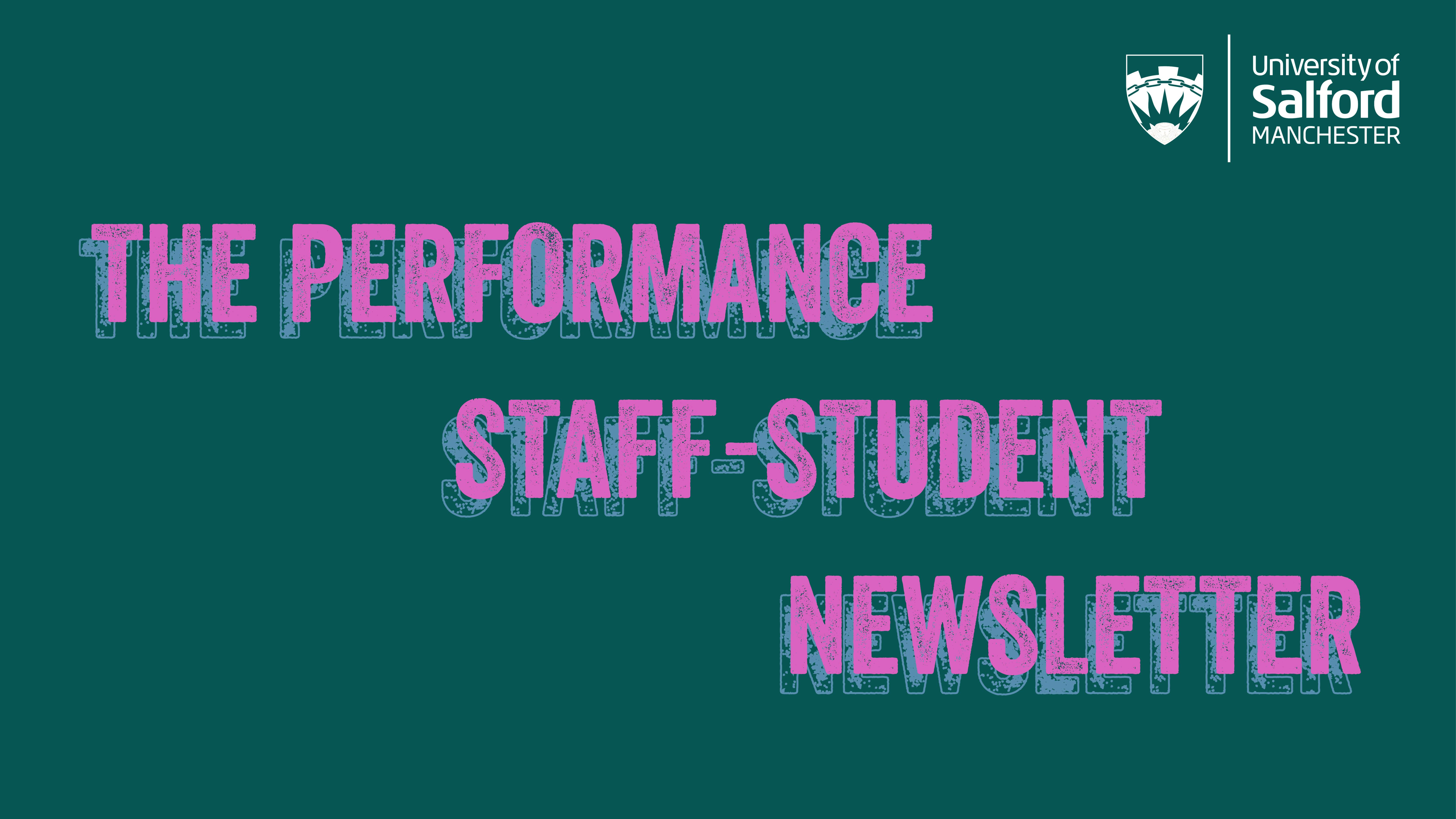
The Performance Subject group are delighted to launch our very first edition of the Staff-Student Newsletter.
We have designed this as a platform to share relevant projects and activities that our community of students and staff are involved in. We want to hear about the creative things – both great and small – that our students are doing outside of your course work, and to share these with your fellow community. We also want to share some of the professional and research projects that our staff are involved in, outside of our teaching, so you can get to know us a little better too!
This is going to be more than just a newsletter. This is also where you can pick up all the latest news, ideas and opportunities in theatre and performance, media, comedy and technical theatre. You can also expect to find out what’s on locally, read interviews from key figures around the campus and get the low-down on new tech.
We’re publishing four times a year, in October, January, March and May.
This first edition features some recent staff projects. But we want to hear from you too! Send us the details of your creative activities; calls for contributors; collaborations and upcoming project plans. Send us your press releases for new shows and screenings. And send us your reviews – we’d can’t promise to publish them all (and we may edit them a little) but we’ll feature 2 or 3 in each edition.
You can also send ideas for things you’d like to see featured in the Newsletter. We even want your jokes – the good, the bad and the ugly :)
We hope you like it. With your help and your contributions, we can turn our Newsletter into a really valuable source of info and enjoyment for students and staff.
Send your contributions and ideas for content to our Editorial Team, Abby and Brainne – you know it makes sense!
Abby Bentham a.a.bentham@salford.ac.uk
Brainne Edge b.edge@salford.ac.uk
CONTENTS
Staff Projects
Hints and Tips on the Biz!
Greater Manchester Theatre Round-Up
Student Review: Mrs America
Student Review: A Sketch Show for Depressives

STAFF PROJECTS

Stephen M Hornby, our newly appointed Academic Fellow in Drama & Theatre Practice, is the artistic director of Inkbrew Productions. Inkbrew were commissioned by Bolton Museum, using funding from the Heritage Lottery Fund, to create five #MuseumMonologues to complement the British Museum Desire, Love, Identity exhibition, staged and expanded by Bolton Museum to include rich stories from Bolton’s own LGBTQ+ past.
The hugely successful monologues were captured on film to be enjoyed by audiences online once the exhibition had finished. To celebrate Bolton Pride this September, Bolton Museum has just made the whole series available free online on YouTube. You can view them here.

Jo Scott, Programme Leader MA Contemporary Performance Practice, co-edited her first special issue of a journal recently. The issue, titled Inclusive Intermedialities, was published in the International Journal of Performance Arts and Digital Media in August this year.
You can find the special issue here – it’s also available through the library.

And the end of last year, David Crowley, Academic Fellow in TV and Theatre, wrote and directed a film called Thick as Thieves. Last month it won ‘Best TV/Web Series’ at Rome International Movie Awards!

Jo Leather, Academic Fellow TV and Theatre Drama, recently qualified as a Person-centred Counsellor and Psychotherapist after studying with the School of Health and Society in Salford. This follows 130+ client hours and four years of studying while working and looking after little people – no mean feat!
Jo’s dissertation research will be looking at depression and anxiety in university students and she has plans to slowly build a private practice.
STAFF HINTS AND TIPS ON THE BIZ!

We catch up with Julia Nelson, Programme Leader and lecturer in Media and Performance, to hear about how she has built her career in the arts and what professional tips she can give budding creatives!
How would you describe your career?
That’s an interesting question! For me, it’s very important to work on projects that I’m passionate about and which bring me joy. Alongside my teaching career, I continue to work as an actor and a freelance workshop developer/facilitator with museums and galleries. I’ve also directed lots of work over the last 20 years around the Manchester theatre scene. I’ve worked with some amazing people (and continue to do so). I’ve worked hard to enable myself to have a career which revolves around my passions.
What work are you most proud of from your career?
There are a couple of things which spring to mind here. I was working as a director for a play called Three Sheets by a writer called Chris Marshall. It was a wonderful play which was set during the miner’s strike in 1984/85 and we were set for three performances at The Lowry. It was a full length play which came in at 100 pages. About 8 days before we opened, the female lead had to drop out for personal family reasons and so I stepped in. Although I was very clear about the play from a directorial point of view, I had 8 days to get the lines down (of which there were many!). I spent a few days at the writer’s home, working with her on this epic task. The performances and the play were extremely well received and, looking back, I’m very proud of this work.
From 2004 – 2008, as well as working as an Hourly Paid Associate at the University of Salford, I worked at The Manchester Museum leading on a brilliantly creative project with museums and galleries around the region. Our writer in residence for the project was Lemn Sissay, who developed scripts with participating students based on the history of some of the collections from different institutions. The project culminated annually with a performance of the work at the Royal Exchange Theatre, which I directed each year. The work introduced students to the values of Higher Education alongside the importance of museum collections and how they can embody a narrative. I’m very proud of this work as I know it had an extremely positive and long-lasting impact on the young people who participated.
How can students get an agent outside of the Showcase opportunity in third year? Hints and tips?
Contact them! You have to be extremely pro-active in this area and also be aware that out of every 20 agents you contact, you may only get one reply. This can often be dispiriting, but one has to learn not to take these things personally in our extremely competitive industry. Things are much easier these days with email. After I graduated, I spent a lot of money sending letters and hard copies of headshots out to agents. Also, I got together with a group of like-minded graduates from the course (I studied BA (Hons) Media and Performance at the University of Salford from 1994 – 1997) and we hired out the Green Room (now Gorilla) and staged our own showcase (along with cheese and wine!). There were five members of the company and we delivered the show case twice to around 30 people in total. We were all successful in securing agents at that time. The main advice I can offer here is don’t wait for things to happen, as you will be waiting a long time. Go out there and make them happen!
What should students be doing alongside studies in order to assist with moving into the industry after graduation?
Start developing your CV. Once you have this document in place, you can update it as and when. Also, it’s fine to use all your University experience on this document when you’re just starting off on your career path. Take up the opportunities offered by the University, especially the Masterclass series which is offered to third year students. Making contacts and networking are crucial in our industry. Demonstrate how you are able to work under your own initiative and be a problem solver, rather than someone who gets disheartened when challenges arise (as they inevitably will!). Being a strong team player who remains positive during difficult times is very important. I’d also say here that third year study should be the main priority during this time, as the workload is demanding. Taking on too many outside projects during the important final year of your degree can often lead to additional stress, and result in ‘stretching oneself too thin’. Good time management, prioritising tasks and taking care of your physical and mental health are all very important. Producing excellent work at a modular level can also serve you well in the industry, as our recent graduates have demonstrated. Short films from third year Media and Performance modules such as Creative Techniques and Integrated Production Skills have gone on to be shortlisted and win awards at various film festivals, and those students have industry interest and employment opportunities already. Fantastic achievements!
Any other hints and tips upon graduation?
Consider what you can take forward from your degree into the professional world. For example, I’ve supervised PRP projects with students who have produced excellent live work. One group in particular developed their PRP play after graduation into a one hour piece which they then performed at the Manchester Fringe Theatre Festival. The work was shortlisted for a prize and participating in the event enabled them to make a host of new contacts and their work to reach a much wider audience. Also, speak to your staff team. I’m very proud to be working as part of an amazing team in the Performance directorate who have an absolute wealth of Industry experience and contacts between them.
GREATER MANCHESTER THEATRE ROUND-UP
Compiled by Stephen M. Hornby
Some venues have programmed some socially-distanced live work. Some have some interesting approaches to “liveness” with online synchronous delivery. Some have remained remarkably silent.
Greater Manchester Fringe
Usually a huge season of vibrant work every July. This year, a limited season of work (mostly in person but some online) from 1st October and 30th November, including work from our own students, at The Kings Arms, Salford Arts Theatre and Antwerp Mansion.
Oldham Coliseum
Drowning, the debut play by Dare to Know Theatre, moves into the Auditorium on 12th November. PETRICHOR is a brand new, 360° live action animated virtuality show by award-winning ThickSkin, which will be viewed on medical-grade safe VR headsets on 20th-21st November.
HOME
Live theatre will return to HOME from October with a programme including World Premieres from RashDash, David Hoyle and Robin Richards & Clara Casian. Also returning will be critically-acclaimed artists Javaad Alipoor, Sh!t Theatre and Le Gateau Chocolat, among others.
The Lowry
The Lowry is the major arts complex in Salford, with a large main stage (The Lyric), a second theatre (The Quays, which somewhat bizarrely is currently operating as a court) and a studio and art gallery. The building will re-open for live performances on Friday 27 November with SIX, a musical.
Hope Mill Theatre
The most successful fringe site in Manchester, often mentioned in The Stage, punches well above its weight. They specialise in musicals and will be staging a major new production of Rent.
Salford Arts Theatre
A place for local emerging talent. Currently that have a programme of live singers, one panto and one play, The Well, “a ludicrous new play about illness, friendship and making someone better.”
Bolton Octagon
The Octagon is emerging from a massive rebuilding programme and has nothing scheduled for live performance for this semester. There are some interesting online writing workshops though.
Contact
Contact is completing a refurbishment and is not fully operational yet, but it is a centre for under 30 talent development. It has a good online programme of work and commissions, including October’s BGA (Black Gold Arts) Festival with contributions from Travis Alabanzar and Darren Pritchard.
The New Adelphi Theatre
The New Adelphi Theatre are gearing up to host their annual show Watch US Dance… this time, digitally! Professional choreographers Keira Martin and Josh Hawkins have come together for a first-time collaboration and a brand-new commission for second and third year Dance@Salford students! Join us for a watch-a-long on the 13th of November.

MRS AMERICA: THE TUMULTUOUS TALE OF THE ERA – REVIEW ****
Mrs America follows both sides of the Equal Rights Amendments in the 70s, showing the journey taken by prominent American feminists such as Gloria Steinem in the effort to get the amendment ratified and the conservative opposition Phyllis Schlafly, who does everything possible to prevent it.
The first episode felt jarring, but not through the writing or acting. It felt jarring to watch Phyllis Schlafly, a university educated woman, be so actively against women’s equality. The expectation going into the show was that it would be all from the perspective of the feminists pushing for the amendment, so to be hit with the opposite view was a surprise. Understanding why she felt the way she did was testament to the brilliant acting of Kate Blanchett. The audience could see how she was manipulated by her husband and the men surrounding him, then sneered at and hated by women outside of her republican circle. You want to hate her, and at certain points you do, however you just can’t help but feel that a brilliant mind that could’ve been a great force for the feminist movement was wasted.
The feminists are never presented as the absolute heroes either. The issues they had surrounding tokenism and racism are brought to the audience’s attention and it’s interesting to see how many faces of the movement that have been glorified by modern media actually had deep rooted issues of their own.
Take Betty Friedan, played by Tracey Ullman; her work was one of the catalysts of second wave feminism, but she appeared in the show to be bitter about her success. It had cost her her marriage, and as time moved on, many of her beliefs became outdated and so did she. It was refreshing to see those women portrayed in such an honest way, as real humans instead of faux images of perfection.
The ending feels unsatisfactory; however, I know that it is supposed to be that way. I went into watching the show knowing that the amendment didn’t get ratified in the 70s. I suppose part of me wanted the writers to change that. A happy ending felt well deserved after the trouble seen throughout the program, and yet, no. In a strange way it’s an accurate reflection on the equal rights protests being seen today. A lot of pain and heartbreak is being put into making America a better place and yet as far as politics and law, nothing seems to change. As for Schlafly, the final scene is a powerful one. Seen as too controversial for a woman in politics she is sent to the kitchen to start making dinner. It’s a stark image for the audience – her misguided desperation needed a pro-woman society in order to keep her powerful. She succeeded in fighting against it, leaving her back where she started.
- Ashia Cannon, second year Comedy Writing and Performance


A SKETCH SHOW FOR DEPRESSIVES – REVIEW ****
Throughout lockdown, I have missed live comedy wholeheartedly, and so while I was waiting I took refuge on the NextUp Comedy website, which features stand-up specials from up-and-coming comedians. During the month of August, I fashioned my own personalised Edinburgh Fringe Festival (yes, I was living my best life) from the shows that were featured. A Sketch Show for Depressives was my first watch…
Dramatic, daring, downright outrageous – meet Anna Mann, an eccentric actress who has tread the boards and most likely installed them too (you’ve got to have a back-up!).
The has-been actress (I hope she’s not reading this) – is a comedy character constructed in the mind of Nottingham-born comedy actor and writer Colin Hoult, who has worked in live performance, radio and television for over 15 years. Most recently, you can find him playing a parapsychologist in Ghosts Series 2 (BBC1).
A Sketch Show for Depressives takes us on a deep-dive into some of the personalities Anna has encountered during her time in a therapy group, as well as some anecdotes from Anna’s elusive career. From a PE teacher to a local government candidate, it is amazing watching the master of guises at work – Hoult playing Anna, Anna playing the characters. The idiosyncrasies of the many roles establish and highlight each layer of humour on stage and I don’t think I will ever tire from re-watching the show.
The delivery of each line and each interaction with the audience is so hilarious and quick-witted… The show is a masterclass in alternative sketch character comedy and audience interaction. And that’s why I keep going back for more.
I have never watched a comedy show that has stayed with me so strongly after the first viewing. Anna Mann’s catchphrases and made-up musical numbers feel cemented in my brain and that’s a testament to Hoult’s characterisation, although I will forever be disappointed that Einstein the Musical is not a real thing.
With the help of two backup performers, Anna is able to break through to the audience and give them some guidance on how to fight/give up and learn to live with the ‘black dog’. My personal favourite moments are the sudden short excerpts of fake musical numbers that Anna sings out to no “ripples of recognition”, and also when Anna interacts with her audience, who are totally swept up in the world Hoult has fashioned. They’re visibly loving every moment of the show, which makes the online viewing even more enjoyable as it makes you feel like you are a part of that original audience.
You can watch A Sketch Show for Depressives on NextUp Comedy using their free trial offer! And if you like A Sketch Show for Depressives, check out the next show in the Anna Mann legacy, How We Stop the Fascists. As Anna would say, “F*ck off, I LOVE it!”
- Charlotte Cropper, third year Media and Performance student



